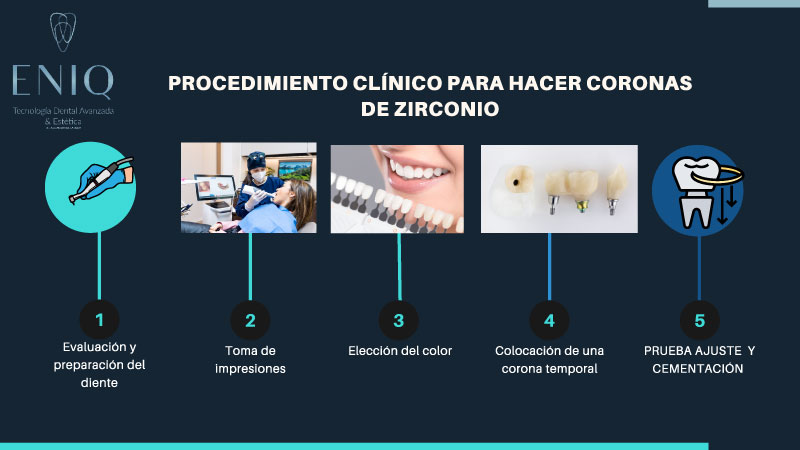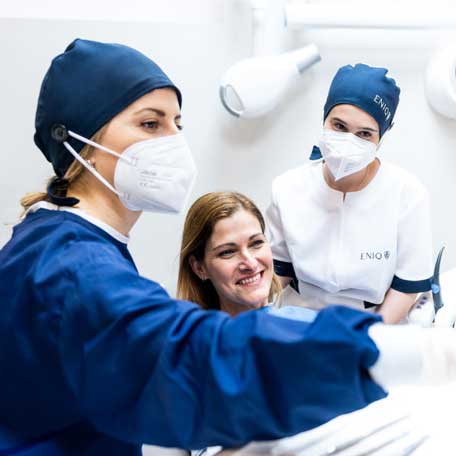

Zirconia Crowns
The perfect choice for a combination of aesthetics and durability.
What are dental zirconia crowns?
Dental zirconia crowns are dental prostheses used to restore damaged or weakened teeth. They are made of zirconia, a ceramic material that is highly resistant and durable. Zirconia is known for its ability to mimic the natural appearance of teeth as it is translucent and can be colored to match the shade of adjacent teeth.
Zirconia crowns are commonly used in dentistry due to their aesthetic and functional properties. They are a popular choice for those who want a durable and natural-looking dental restoration. These crowns are custom-made in a dental laboratory using digital scanning and computer-aided design (CAD/CAM) technology.
To place a zirconia crown, the natural tooth must first be prepared by removing any damaged dental structure. Then, a dental impression is taken and sent to the dental laboratory, where the custom crown will be fabricated. During this time, a temporary crown may be placed to protect the prepared tooth.
Once the zirconia crown is ready, it is permanently cemented onto the prepared tooth. The dentist ensures that it fits correctly and aligns with the patient's bite. After placement, the zirconia crown looks and functions like a natural tooth, restoring the original tooth's shape, function, and aesthetic appearance.
Zirconia crowns offer several advantages, such as fracture resistance, durability, and the ability to withstand wear. Additionally, they are biocompatible, meaning they are well-tolerated by oral tissues and do not cause allergic reactions.
However, it's important to note that each dental case is unique, and the choice of crown material will depend on various factors, such as the tooth's location, aesthetic needs, and patient preferences. It is recommended to consult with a dentist to determine if zirconia crowns are suitable for your specific case.
How are zirconia dental crowns made, what is the clinical procedure?
The clinical procedure for the fabrication and placement of zirconia dental crowns involves the following steps:
- Evaluation and tooth preparation: The dentist will evaluate the damaged or weakened tooth and determine if any prior treatment, such as cleaning or a root canal, is necessary. Then, the tooth is prepared by shaving or removing a portion of the dental enamel to create space for the crown.
- Impression taking: Impressions of the prepared teeth are taken using impression materials. These impressions are sent to the dental laboratory, where the custom zirconia crown is fabricated.
- Color selection: The dentist and the patient will select the color of the zirconia crown to match the shade of adjacent teeth and integrate naturally into the smile.
- Placement of a temporary crown: While the custom zirconia crown is being fabricated in the dental laboratory, a temporary crown is placed over the prepared tooth to protect it and maintain the aesthetic appearance.
- Fabrication of the zirconia crown: In the dental laboratory, digital scanning and computer-aided design (CAD/CAM) technology are used to create the zirconia crown. Three-dimensional scanning of dental impressions serves as the basis for designing a custom crown that fits perfectly on the prepared tooth.
- Testing and adjustments: Once the zirconia crown is ready, a trial is conducted in the patient's mouth to verify fit, shape, and aesthetic appearance. The dentist may make adjustments to the crown as needed.
- Cementation: After ensuring that the zirconia crown fits correctly, it is permanently cemented onto the prepared tooth. The dentist uses high-quality dental cement to secure it in place.
- Final adjustments: Once the crown is cemented, a final check is performed to ensure that the fit and bite are correct and comfortable.
The clinical procedure for zirconia crowns may vary depending on the clinical situation and the dentist's preferences. It is important to follow the recommendations and specific protocols of the dental professional responsible for the treatment.

Duration
How many appointments are needed for the creation of a dental crown or cover?
The number of appointments required for the creation of a zirconia crown can vary depending on several factors, such as the dentist's protocol, the complexity of the case, and the availability of technology in the dental office. However, in general, at least two appointments are typically needed to complete the process of placing a zirconia crown. Below is a description of a typical scenario:

Typical Procedure:
- Evaluation and tooth preparation: In this initial appointment, the dentist will assess the damaged tooth and determine if a zirconia crown is the appropriate option. If it is decided to proceed with the zirconia crown, the tooth will be prepared, involving the shaping or removal of a portion of dental enamel to create space for the crown.
Impression Taking: Once the tooth is prepared, impressions of the prepared teeth and occlusion will be taken. These impressions will be sent to the dental laboratory for the fabrication of the custom zirconia crown. In the meantime, a temporary crown will be placed to protect the prepared tooth.
- Placement of the zirconia crown: In this appointment, the custom zirconia crown has been fabricated in the dental laboratory, and it will be placed. The dentist will remove the temporary crown and test the zirconia crown in the patient's mouth to verify the fit, shape, and aesthetic appearance. If everything is in order, the zirconia crown will be permanently cemented onto the prepared tooth.
Additional appointments may be required if adjustments or modifications to the zirconia crown are needed before its final placement. It is important to follow the recommendations and the specific treatment plan provided by the dentist in charge of the case, as the number of appointments may vary depending on individual circumstances.
Appointments Needed at ENIQ:
- Initial Evaluation: In this appointment, the dentist will examine the affected tooth and discuss your needs and treatment options. X-rays will be taken, and overall dental health will be assessed.
- Tooth Preparation, Digital Scanning, and Crown Placement: In a single day.

What are the advantages and disadvantages of zirconia dental crowns?
Advantages:
- Strength: Zirconia is an extremely strong and durable material, highly resistant to fractures and wear.
- Biocompatibility: Zirconia is biocompatible, making it safe for oral tissues and causing no allergic reactions.
- Precision and Fit: Made with digital scanning and computer-aided design (CAD/CAM) technology, zirconia crowns offer greater precision in fit and shape.
Disadvantages:
- Cost: Zirconia crowns tend to be more expensive due to the material and technology used in their fabrication.
- Fragility in Exceptional Cases: Although it is a strong material, in exceptional cases, zirconia crowns may be more prone to fractures compared to other options.
- Increased Wear on the Opposing Tooth: Zirconia's hardness can lead to increased wear on opposing teeth while chewing, requiring additional occlusal adjustments.
It's important to note that the advantages and disadvantages of zirconia dental crowns may vary depending on each case and individual preferences. It is recommended to consult with a dentist for a comprehensive evaluation and to determine the most suitable dental crown option for each situation.
Which are better, zirconia crowns, lithium disilicate crowns, or porcelain-fused-to-metal crowns?
The choice between zirconia crowns, lithium disilicate crowns, and porcelain-fused-to-metal crowns depends on various factors, including the patient's needs and preferences, the location of the tooth to be restored, desired aesthetics, and the dentist's recommendation. Each type of crown has its own advantages and considerations.
Zirconia Crowns:
- Advantages: Very strong and durable, less prone to fractures and wear. Biocompatible.
- Considerations: Can be more expensive and, in exceptional cases, more prone to fractures.
Lithium Disilicate Crowns:
- Advantages: Aesthetic and translucent ceramic material, strong and durable. Biocompatible and customizable.
- Considerations: May have a higher cost and be less durable than zirconia in certain cases.
Porcelain-Fused-to-Metal Crowns:
- Advantages: Good combination of aesthetics and strength. Metal for strength and durability, porcelain for a natural appearance.
- Considerations: May show a grayish line at the gum and require more tooth reduction to accommodate the metal.
Ultimately, the choice between zirconia, lithium disilicate, or porcelain-fused-to-metal crowns will depend on the individual needs of the patient and the recommendations of the dentist. It is important to discuss the different materials and options available to determine the best solution for each specific case.
+95%
What is the success rate of dental crowns?
Zirconia crowns have a high success rate and are considered a reliable option for dental restoration. However, it's important to note that the success of a zirconia crown depends on various factors, including the quality of the work performed by the dentist, the patient's oral care, and the overall health of oral tissues.
In general, zirconia crowns are considered to have a high long-term success rate, with a survival rate that typically exceeds 95% after five years. However, some studies and systematic reviews may show different success rates based on the evaluation criteria used and the specific conditions of each case.
It's important to emphasize that proper maintenance and oral care are key factors in ensuring the longevity and success of any dental crown, including zirconia crowns. It is recommended to maintain good oral hygiene, brush teeth twice a day, use dental floss, and attend regular check-ups with the dentist. Additionally, avoiding harmful habits such as biting hard objects or opening packages with teeth can contribute to extending the lifespan of zirconia crowns.
It's important to consult with an experienced dentist and follow their specific recommendations to maintain the long-term success of zirconia crowns.
What are the benefits of choosing zirconia crowns at ENIQ?
Opting for zirconia crowns using advanced technology like digital scanning and computer-aided design/computer-aided manufacturing (CAD/CAM) offers several benefits. These include:
- Greater Precision: CAD/CAM technology allows for digital scanning of teeth and the creation of accurate three-dimensional models. This ensures a better fit of zirconia crowns to the prepared tooth, resulting in a more precise fit and a more accurate dental restoration.
- Customization: Digital scanning and computer-aided design enable optimal customization of zirconia crowns. Digital models can be modified to suit the individual patient's needs in terms of shape, size, color, and texture. This ensures that the zirconia crown seamlessly integrates into the smile and looks natural.
- Speed: CAD/CAM technology allows for a faster process compared to traditional crown manufacturing methods. Eliminating the need for physical impressions and sending them to a dental lab speeds up the production and placement time of zirconia crowns.
- Shorter Waiting Time: By using CAD/CAM technology in the dental office, it's possible to fabricate zirconia crowns on the same day. This means the patient can receive the dental restoration in a single visit, eliminating the need for a temporary crown and a return appointment.
- Less Discomfort: Digital technology reduces the need for invasive procedures and traditional impression-taking, which can be more comfortable and less bothersome for the patient. Additionally, the removal of a temporary crown reduces the risk of sensitivity or discomfort associated with its use.
Overall, the combination of zirconia crowns and CAD/CAM technology provides significant benefits in terms of precision, customization, speed, and patient comfort. It is advisable to consult with a dentist who uses advanced technology to achieve the best results in the zirconia crown placement process.
What is the price of zirconia crowns?
Dental Crown
Porcelain
*subject to specialist evaluation
In the case of a zirconia dental crown, the price would be above 400€.
-
All-inclusive
Frequently Asked Questions
Do you have more questions about zirconia crowns?
In general, zirconia crowns have long-term durability, with a survival rate that typically exceeds 95% after five years. Proper care and regular check-ups are key to maximizing their lifespan.
Yes, zirconia crowns are a versatile option and can be suitable for most patients. However, it is crucial to consult with the dentist to assess individual needs and determine the best treatment option.
Zirconia crowns offer significant aesthetic benefits as the material resembles the color and translucency of natural teeth. This ensures a natural and aesthetically pleasing appearance.
Maintaining good oral hygiene, brushing your teeth twice a day, using dental floss, and attending regular check-ups with the dentist are key practices to ensure the longevity and long-term success of the crowns.
